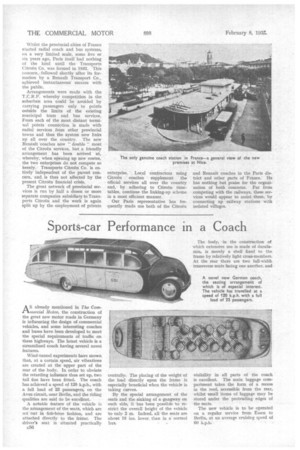Sports-car Performance in a Coach
Page 118

If you've noticed an error in this article please click here to report it so we can fix it.
AS already mentioned in The Commercial Motor, the construction of the great new motor roads in Germany is influencing the design of commercial vehicles, and some interesting coaches and buses have been developed to meet the special requirements of traffic on these highways. The latest vehicle is a streamlined coach having several novel features.
Wind-tunnel experiments have shown that, at a certain speed, air vibrations are created at the upper part of the rear of the body. In order to obviate the retarding influence thus set up, two tali fins have been fitted. The coach has achieved a speed of 120 k.p.h., with a full load of 23 passengers, on the AVLIS circuit, near Berlin, and the riding qualities are said to be excellent.
A notable feature of the vehicle is the arrangement of the seats which are set out in fish-bone 'fashion, and are attached directly to the frame: The driver's seat is situated practically
c5t3 centrally. The placing of the weight of the load directly upon the frame is especially beneficial when the vehicle is taking curves.
By the special arrangement of the seats and the sinking of a gangway on each side, it has been possible to restrict the overall height of the vehicle to only 2 m. Indeed, all the seats are about 18 ins, lower, than in a normal bus. The body, in the construction of which extensive use is made of cluralumin, is merely a shell fixed to the frame by relatively light cross-members. At the rear there are two full-width transverse seats facing one another. and
visibility in all parts of the coach is excellent. The main luggage compartment takes the form of a recess in the roof, accessible from the rear, whilst small items of luggage may be stored under the protruding edges of the seats.
The new vehicle is to be operated on a regular service from Essen to Berlin, at an aVerage cruising speed of CO k.p.h.














































































































































































